What Procedures Are in Place to Protect Lung Cancer Clinical Trial Participants?
What Procedures Are in Place to Protect Lung Cancer Clinical Trial Participants? from Patient Empowerment Network on Vimeo.
What safety measures are in place to protect people in lung cancer clinical trials? Dr. Grace Dy reviews protocols to help maintain clinical trial safety.
Dr. Grace Dy is Chief of Thoracic Oncology and Professor of Oncology in the Department of Medicine at Roswell Park Comprehensive Cancer Center in Buffalo, New York. Learn more about Dr. Grace Dy.
See More From Lung Cancer Clinical Trials 201
Related Resources:

|

|
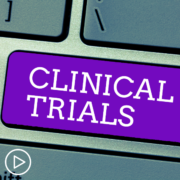
|
Transcript:
Katherine Banwell:
What safety measures are in place to safeguard patients?
Dr. Grace Dy:
So, there’s a lot of safety measures involved. Not just within the protocol but there are also governing committees. IRB, Scientific Review committees, that look over – and these committees typically also, actually, involve some patient advocates that will be reviewing the protocols to make sure it’s not just a scientific aspect that is looked into but also patient perspectives that are looked into when we review these protocols.
So, from the medical perspective, protocols are generally written with guidelines to help treating doctors how to manage side effects. For example, because of the intense preparation – what we call pre-clinical, meaning the preparation done in animal models, in learning from other settings, for example; from other drugs, for example. If it’s not the first in class, you have a sense of what potential side-effects might be expected and so you prepare accordingly.
Lung Cancer Clinical Trials | Addressing Common Patient Concerns
Lung Cancer Clinical Trials | Addressing Common Patient Concerns from Patient Empowerment Network on Vimeo.
Considering a lung cancer clinical trial can feel overwhelming and brings up a number of questions. Dr. Grace Dy reviews common concerns from patients, and explains how and when placebo may be used in trials.
Dr. Grace Dy is Chief of Thoracic Oncology and Professor of Oncology in the Department of Medicine at Roswell Park Comprehensive Cancer Center in Buffalo, New York. Learn more about Dr. Grace Dy.
See More From Lung Cancer Clinical Trials 201
Related Resources:
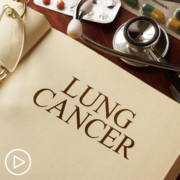
|

|

|
Transcript:
Katherine Banwell:
What are some common concerns you hear from patients when discussing lung cancer clinical trial options?
Dr. Grace Dy:
When I discuss clinical trials, the first question generally patients ask is: well, how effective is the drug, right? And the second question will be: well, what are the side effects? And those are very valid questions, but we may not always have an answer to it, especially if they’re in early phase. I do a lot of early phase clinical trials, meaning sometimes we don’t even know the proper dose of the drug to use, for example.
And the intent of the trial, for example, in Phase I, generally, is to find out what is a proper dose to use that is safe and effective before we can do a test in Phase II setting using the recommended dose to test it out more rigorously how well it works. And if it passes Phase II, then we go to Phase III, which then generally is comparing it with the standard to see whether it will be better or at least equivalent or non-inferior.
And you may ask, “Well, why even do a non-inferior?” Because, well, some drugs, it may not prolong your life more than current therapies, but if it has better side effect profile, right? So, there are actually drugs that are approved through non-inferiority trials. But those are the common concerns, and I think another common concern that I hear when I talk about trials, patients are concerned about receiving placebo.
Katherine Banwell:
And what do you tell patients?
Dr. Grace Dy:
Well, it depends on the design of the trial and the question that is being answered. So, in fact, for example, some situations in the standard of care is not to do anything. The best way to remove bias is to administer a placebo because the standard care would be not to do anything. And those, generally, are Phase III, you know. An early phase, Phase I, Phase II generally there are no placebo involved. I mean, there are some randomized Phase II trials that there are placebo involved and I explain to the patient why placebo may be involved and it’s usually on top of a standard of care. So, there could be a standard of care therapy but you add something else. So, you want to compare it with a new drug plus the standard of care. So, you might add placebo so that the doctors will not be bias when they measured their scans, for example. They say oh, this patient is getting this experimental drug. So, they’re excited. They might oh, you know, make it look better than what it actually is.
Katherine Banwell:
Now, as a researcher yourself, do you always know that a placebo is part of the clinical trial testing?
Dr. Grace Dy:
Yes, it will be in the design. So, it will say there is a placebo control. So, the title, or the design, generally will tell you this is a randomized, double-blind placebo control. Usually if there is a blinded there might be some placebo involved because then you don’t know what people are getting.
Questions to Ask Before Participating in a Lung Cancer Clinical Trial
Questions to Ask Before Participating in a Lung Cancer Clinical Trial from Patient Empowerment Network on Vimeo.
When considering clinical trial participation, what questions should patients ask their healthcare team? Dr. Tejas Patil, a lung cancer specialist at the University of Colorado Cancer Center, shares advice on what patients need to know when considering joining a clinical trial.
Dr. Tejas Patil is an academic thoracic oncologist at the University of Colorado Cancer Center focused on targeted therapies and novel biomarkers in lung cancer. Learn more about Dr. Patil, here.
See More From Lung Cancer Clinical Trials 201
Related Resources:

|
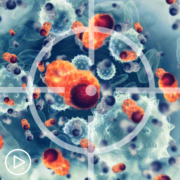
|

|
Transcript:
Katherine:
When considering clinical trial participation, what questions should patients be asking their healthcare team?
Dr. Patil:
So, couple of questions that I think are really important for patients to ask their healthcare team is what is the current standard of care? So, if you’re enrolling in a clinical trial, you want to know that you’re receiving some kind of drug.
And its expected effectiveness should be compared to what is considered the current standard of care for whatever line of therapy that is. The other practical questions that patients should be asking is what is the schedule of therapy? So, how frequently am I supposed to come in? Am I supposed to get a biopsy?
Am I supposed to get blood draws? Most clinical trials will come with a schedule or a calendar for patients, and it’s helpful for them to look that over and see what’s being asked of them. And then the last thing is what are the known side effects? Now I always tell patients with a clinical trial, we don’t always know the side effects as part of the reason we’re doing the clinical trial.
But if there’s some experience or if the doctors enrolled other similar patients in this trial asking what are the foreseeable side effects is actually really important.
When to Consider a Clinical Trial for Lung Cancer Treatment
When to Consider a Clinical Trial for Lung Cancer Treatment from Patient Empowerment Network on Vimeo.
When it comes to non-small cell lung cancer treatment options, where do clinical trials fit in? Dr. Tejas Patil of the University of Colorado Cancer Center explains how he discusses clinical trial participation with patients.
Dr. Tejas Patil is an academic thoracic oncologist at the University of Colorado Cancer Center focused on targeted therapies and novel biomarkers in lung cancer. Learn more about Dr. Patil, here.
See More From Lung Cancer Clinical Trials 201
Related Resources:

|

|

|
Transcript:
Katherine:
When it comes to non-small cell lung cancer treatment options, where do clinical trials fit in?
Dr. Patil:
So, clinical trials are very important to advancing our knowledge and advancing our ability to care for patients in the best way possible. What I frequently get asked from patients is am I going to be a guinea pig for a clinical trial? And I think it’s really important to emphasize that clinical trials are comparing the best-known standard of care to something new.
So, in effect you would never be a guinea pig. You would really just be receiving what is the best-known standard of care. And that would be compared to some novel approach to treating cancer. In general, I’m very encouraging of patients to enroll in clinical trials.
I discuss the pros and cons of this because there are logistical concerns to keep in mind when patients are thinking about enrolling in clinical trials. If a patient enjoys traveling, and enjoys wanting to spend time with their family, that has to be balanced against the regimented schedule that some clinical trials may have.
If they live in a rural part of the state and they have to travel three to four hours weekly, that’s a decision that has to be had and be made. But in general, if a patient is eligible and willing, I’m strongly encouraging that patients enroll in clinical trials to help further the knowledge of the field.
Katherine:
Yeah. Are there clinical trial options available for patients who have already been treated with another therapy?
Dr. Patil:
Yes. So, the clinical trials come in variety of forms and patients are eligible at various stages.
So, there are some clinical trials that require patients to be newly diagnosed. And so, the trial would be the “first therapy” that they receive. But many trials actually I would say the majority of clinical trials in lung cancer are looking at patients who’ve progressed on the first line of treatment and are now facing the possibility of receiving second line treatments or further. So, that’s a common place for patients to enroll in clinical trials.
Where Do Clinical Trials Fit Into a Lung Cancer Treatment Plan?
Where Do Clinical Trials Fit Into a Lung Cancer Treatment Plan? from Patient Empowerment Network on Vimeo.
Clinical trial participation is essential to advancing cancer care options. Dr. Estelamari Rodriguez shares how clinical trials are providing lung cancer patients with more treatment approaches and discusses the safety protocols in place to protect patients.
Dr. Estelamari Rodriguez is Associate Director of Community Outreach – Thoracic Oncology at the Sylvester Comprehensive Cancer Center, University of Miami Health System. Learn more about Dr. Rodriguez, here.
See More From Lung Cancer Clinical Trials 201
Related Resources:

|

|
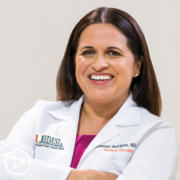
|
Transcript:
Katherine Banwell:
Dr. Rodriguez, research advances aren’t possible without patients participating in clinical trials.
So, where do clinical trials actually fit into a lung cancer treatment plan?
Dr. Estelamari Rodriguez:
So, clinical trials are really what move the science of all these developments that we saw at the oncology conference, the ASCO conference.
So, it’s not until patients join trials that we can approve drugs. So, I think clinical trials are very important, so we move the science. But then, for specific patients in lung cancer, now that we’re moving all of our best therapies upfront, we run out of options faster than we did for some patients. So, it is important that A) that we have access to clinical trials, which if we look across the country many of our cancer patients don’t have either Phase I programs near them, they’re very difficult to get to, or very expensive to get to.
So, we have to do a lot in terms of increasing access to clinical trials.
But I think your specific question has to do where it comes in. I think if you have advanced lung cancer, where most patients today will not have a cure, clinical trials is at the center of things that should be considered from the get-go. Sometimes some of the drugs are what is called Phase I, that these are new drugs that we’re trying to find a dose, we don’t really understand the efficacy of the drugs. So, those trials are reserved for patients that have failed standard treatment.
But then we have patients with very difficult situations that are progressing really fast that should join clinical trials. And I think that as we do more biomarker testing, we are learning a lot about the individual patient tumor.
So, the promise of precision medicine is that you can actually find drugs for specific patients, and that’s what clinical trials that are called basket trials, where if you have a mutation regardless of your tissue of origin. So, for example, we have two large basket trials that we are enrolling patients, one called the TAPUR trial and the other one called MATCH.
And MATCH is organized by the NCI and TAPUR by ASCO, and these trials if you find you have a biomarker analysis of next generation sequence, you find a specific mutation, you can actually see there’s a trial for this specific patient. So, the trials come in, I think they’re very critical to move the science, they’re very important for individual patients with rare mutations, but I think it’s upon us to make sure that these trials are available.
Katherine Banwell:
What advice do you have for patients who may be hesitant to participate in a clinical trial?
Dr. Estelamari Rodriguez:
So, I think you have to ask questions, I think that there’s a lot of misconceptions in different communities. So, we take care of a lot of Hispanic patients, and we have kind of really have to do a lot of education about what patients and patients family’s think about. Because sometimes I feel I have to convince the family members before I can get to really talk to the patient about the trials.
But I think in the past, trials have been considered only experimental, and patients are used for science but not really getting a benefit. So, I think that’s the first misconception. When we open a trial at our cancer center, and I’m part of the experimental therapeutics’ unit, we are opening trials that we believe that that science will move and offer something in addition. So, I think, that is not because we want to do an experiment, it’s because we really want to offer this patient the latest, or something new, that could potentially offer them a better response than what we are achieving with our standard treatments.
So, I think that’s the first misconception, that these are experiments on patients and patients don’t benefit. The whole point of the trial is to find better drugs and benefit.
So, it’s been shown in multiple parts of the country and big cancer centers that patients that join clinical trials do better at the stage of their disease. And part of the reason that they do better is that instead of having one doctor that is making decisions, and they’re running out of options, and kind of coming up with ideas out of nowhere, when you join a Phase I clinical trial or an organized trial, you have at least 10 to 20 doctors that are looking at your case or reviewing your images. There’s a lot of check to make sure that you’re not getting unwanted toxicity and that the trial is stopped if you’re not getting a benefit.
And this is important so that we don’t expose more patients to toxicity, but that’s another misconception that it’s not safe. And we’ll do our best to make sure that it’s safe.
Lung Cancer Research Highlights From ASCO 2022
Lung Cancer Research Highlights From ASCO 2022 from Patient Empowerment Network on Vimeo.
Lung cancer specialist Dr. Estelamari Rodriguez shares research updates from the 2022 American Society of Clinical Oncology (ASCO) annual meeting, including the latest advances in immunotherapy and inhibitor therapy.
Dr. Estelamari Rodriguez is Associate Director of Community Outreach – Thoracic Oncology at the Sylvester Comprehensive Cancer Center, University of Miami Health System. Learn more about Dr. Rodriguez, here.
See More From Lung Cancer Clinical Trials 201
Related Resources:

|

|
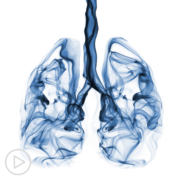
|
Transcript:
Katherine Banwell:
Cancer researchers recently came together at the annual ASCO meeting. Were there any highlights at the meeting that you think lung cancer patients should know about?
Dr. Estelamari Rodriguez:
So, sometimes we look at the conference, and we look at the plenary sessions. And if we don’t see a lung cancer abstract centered at the big plenary session, we feel that nothing happened, but a lot happened. We are learning that all the advances in terms of immunotherapy and targeted therapies can be used earlier and earlier for patients. So, we had data on the NADIM trial, which is a trial out of Spain where they use neoadjuvant, chemo immunotherapy.
We already have that approved in the United States with nivolumab (Opdivo), and they use also nivolumab with a different combination chemotherapy. What was really amazing is that you can replicate this data that is used in immunotherapy before surgery, patients can have very dramatic pathologic complete responses. Which means that at the time of surgery, we don’t find cancer, and that portends a better prognosis. And obviously, we’re trying to do our best for patients. So, that was really, I think, confirms the data that we have seen that immunotherapy can be used earlier.
We also saw updates of trials that had been ongoing looking at the use of immunotherapy in difficult settings. So, there was a trial also out of Spain called the ATEZO-BRAIN trial where they look at the use of immunotherapy Atezolizumab for patients that have brain disease and diagnosis of metastatic disease.
And for a long time, we thought that immunotherapy responses really wouldn’t work in the brain, and we saw that in this trial they were able to control disease in the brain, delay the use of radiation for these patients, and improve their quality of life. So, I think that was, again, a strong message that immunotherapy is here to stay, we can use it in your patients. Then, the third section of trials that were very telling were updates of new drugs for targeted therapy. So, we know today that we have about nine actionable mutations in lung cancer.
So, that is very important that we understand that when a patient gets diagnosed, do they have an actionable mutation, a genetic change that we can target? And that is really the promise of precision medicine, so they present the data for a new drug for KRAS G12C mutation, positive patients call it aggressive. And we already have a drug that was approved about a year ago called sotorasib.
And these drugs are used on patients that previously we knew will do very poorly with chemotherapy and immunotherapy because this KRAS G12C mutation is actually a very common mutation in lung cancer, more common than the other mutations that we have approved targeted therapies in the past, and it’s been difficult to treat.
So now, we have another drug that shows a very good response rate after patients have failed chemo and immunotherapy. It’s still not as a dramatic response as we have seen on the third generation EGFR, ALK and ROS inhibitors, but still a really good promise for patients that didn’t have an option.
So, that was good, they also updated more data on some of the third-generation drugs for ALK. So, we have seen in a prior conference called ACR the drug lorlatinib (Lorbrena), which a third-generation ALK inhibitor, has showed already improvements for patients that have failed prior therapies.
But now they’re showing that for patients in the frontline setting when they first diagnose, receiving a third generation ALK inhibitor can improve brain responses. So, they saw a very dramatic has a ratio of .8, so basically over 80 percent of the brain disease was controlled, and in some complete responses were seen.
And then, patients had a median survival that was over the three-year mark, which had been seen with the prior ALK inhibitors. So, I think it just goes to show that the progress in targeted therapies for lung cancers is exponential, that once we understand the genetic pathways, and we can develop better drugs.
For example, this lorlatinib drug was actually developed in a way that it will stay in the brain longer, because we know that that’s an area where patients have failed. So, really understanding where the prior drugs have failed, where this resistance has been happened, allows us to develop better drugs for patients. So, I think it’s definitely very hopeful conference. I think the best part of the conference was people coming together, because I think that’s when investigators have the opportunity to collaborate and think of new ideas.
So, I think that we don’t take it for granted that we were able to have an in-person conference, which hadn’t happened in two years. We had patient advocates that joined as well, so that’s also very important that the patient advocates are part of the research program, and ideas, and presentations.



